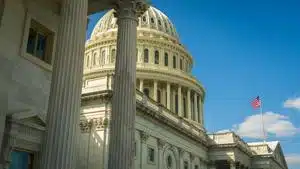(The Center Square) – U.S. Sen. Ted Cruz, R-Texas, has introduced a bill to designate the Muslim Brotherhood as a terrorist organization.
Cruz introduced the Muslim Brotherhood Terrorist Designation Act again this year after doing so in 2015, 2017, 2020 and 2021. U.S. Rep. Mario Díaz-Balart, R-Florida, introduced companion legislation in the House, as he has also previously done. The bill has multiple cosponsors.
“The Muslim Brotherhood is a terrorist organization,” Cruz said, which is “committed to the overthrow and destruction of America and other non-Islamist governments across the world, and pose an acute threat to American national security interests. American allies in the Middle East and Europe have already labeled the Brotherhood a terrorist organization, and the United States should do the same, and do so expeditiously.”
The bill states the Muslim Brotherhood “functions as a global terrorist organization and provides material support to [its] branches in countries and territories by providing political support, financial resources, training, services, expert advice, and communications assistance.” Its branches have “sought to destabilize and undermine United States allies and partners throughout the Middle East, including in Bahrain, Egypt, Jordan, Saudi Arabia and the United Emirates, and have been outlawed as a terrorist group by the governments of those countries.”
The bill amends the Anti-Terrorism Act of 1987 to include banning all Muslim Brotherhood members from the U.S., making them ineligible for visas or admittance to the U.S. This includes revoking visas of all non-U.S. citizens who are confirmed Muslim Brotherhood members and removing them from the country. It also requires the Secretary of State to impose sanctions on any Muslim Brotherhood branch, charity or organization that is directly or indirectly controlled by the Muslim Brotherhood, including Hamas.
“The global Muslim Brotherhood has numerous regional branches, including terrorist organizations such as Hamas, and spreads violence and instability throughout the Middle East,” Díaz-Balart said. “For this reason, it is crucial to U.S. national security interests that we prohibit U.S. dollars from enabling the Muslim Brotherhood’s dangerous activities, and that we ensure Muslim Brotherhood members are blocked from entering the United States. This important legislation gives the Trump Administration the additional authority it needs to protect Americans, and our closest allies, from this insidious threat.”
The Muslim Brotherhood was founded by Egyptian politician Hassan al-Banna in 1928 as a Sunni Islamic militant group. Over the next few decades, it grew to have hundreds of thousands of followers in multiple countries in the Middle East and north Africa. After a failed assassination attempt of Egypt’s prime minister in 1948, the Egyptian government cracked down on Muslim Brotherhood members, arresting them, trying them for treason and executing them.
By the 1980s, the Muslim Brotherhood saw a resurgence in Egypt and multiple countries. In 1987, its Palestinian branch emerged as Hamas in Gaza, committed to the destruction of Israel. The preamble to the 1988 Hamas Covenant of the Islamic Resistance Movement includes the famous claim, “Israel will exist and will continue to exist until Islam will obliterate it, just as it obliterated others before it,’” made by al-Banna, The Center Square reported.
Since then, Hamas has taken credit for a range of terrorist acts, including the Oct. 7, 2023, terrorist attack against Israel, resulting in the death of more than 40 Americans and the kidnapping at least 53 Americans.
The bill was proposed after antisemitic incidents drastically increased nationwide, reaching their highest level on record last year of nearly 10,000, The Center Square reported. Cruz and U.S. Rep. Monica De La Cruz, R-Texas, have been targeted by pro-Hamas rioters and vandals, including at Cruz’s Houston home and at a U.S. Senate hearing, and at De La Cruz’s offices, The Center Square reported.
Hamas has been designated as a foreign terrorist organization by the U.S. government since 1997.
After the Hamas Oct. 7 terrorist attack, the U.S. House passed the Hamas International Financing Prevention Act, HR 340, In November 2023. Filed by U.S. Rep. Brian Mast, R-Florida, it would have required the executive branch to impose sanctions on foreign actors that provide certain types of support to Hamas or its affiliates. It went nowhere in the Democratic-controlled Senate.
Cruz has also repeatedly called on the president to designate the Muslim Brotherhood as a terrorist organization. Last month, U.S. Rep. Jared Moskowitz, D-Florida, called on the president to do so highlighting actions taken by other governments.
To date, the governments of Austria, Bahrain, Egypt, Jordan, Saudi Arabia, and United Arab Emirates have designated the Muslim Brotherhood as a terrorist organization.


















































